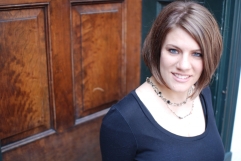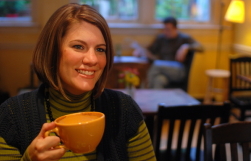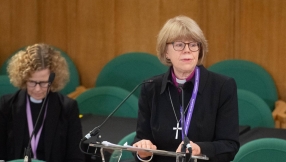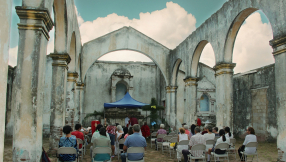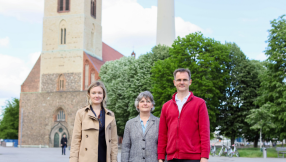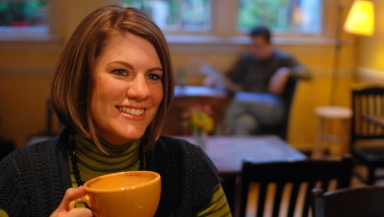
Much has been made of American blogger and author Rachel Held Evans' decision to leave the evangelical church and attend an Episcopal church. But her latest book, 'Searching for Sunday: loving, leaving and finding the church' (Nelson Books), is about more than that, and it would be a shame for it to be reduced to the binary terms of the very labels she is trying to escape.
After all, the book is a memoir, not a doctrinal thesis. The reflections she makes based on her own journey and those around her – such as a return to tradition – are not necessarily a blueprint for all millennials, but could be seen instead as a report from the front line: what it looks like to try and come to terms with your religious heritage, and find a new and living faith as an independent, thinking adult.
Evans admits that her decision to join the Episcopal Church may indeed be a reaction to her upbringing in the contemporary evangelical church, and had she been brought up in a more traditional context, perhaps her current leanings would be different.
'Searching for Sunday' is structured around the seven sacraments of the Catholic tradition: baptism, confession, holy orders, Communion, confirmation, annointing the sick and marriage. Each section starts with a literary meditation on one of the sacraments; collected musings on biblical references to water in the section on baptism, for example. Meditating on the these expressions of faith is about trying to make faith real, visceral and fresh – something she sees as being more about substance than the style of our worship. The emphasis on the sacraments could be seen as an easy way out – 'give me something to do so I don't have to believe'. But it also seems to have breathed life into the spirit of her faith – and the believing part too.
What do you see as being the characteristics of millennial faith?
No two millennials are the same, so I am a little careful of trying to speak on behalf of the entire generation. But I do think less important to millennials is style and trying to make it hip, or cool or edgy. A lot of people assume that's' what will bring them back to church, and that maybe underestimates them a bit and underestimates why we leave the church, and why we find ourselves coming back. The reasons are a lot more complex, and have more to do with changes in the culture and big questions that we have about faith. I would say millennials are not quite as shallow as people assume that they are. It's very important to us to wrestle with questions of faith and to find communities who are willing to wrestle with us.
For instance, millennials are getting married later in life than any previous generation. That affects how we think about church. Especially if we are part of churches that don't really speak to or offer much for singles. A lot of people I know check out of church when they're in their young adulthood and not married, because the church isn't really addressing the questions that they have at that stage of life.
You've said that millennials aren't that interested in style. Can the Church really chuck out the high-tech approach and start again with a 'socks and sandals' simplicity?
The style itself is not as important. I can see where people still connect with contemporary worship or something like that. It's not so much about style, it's just there has to be more. I think we long for real depth in church. If it's the same old same old, but with a light show and a fog machine, I don't think that's enough, I don't think that's going to cut it. But if there's a real depth to that community and if there are opportunities to wrestle with big questions, if it's inclusive, and not judgemental, well then the style can vary from group to group.
I personally have really connected with a more traditional style, but I get that that's not everybody's experience. For me, it's refreshing, coming out of the more contemporary evangelical culture, to have a more stripped down, traditional, no-one's-trying-to-sell-me-anything type of worship. But that's probably more a reaction, than reflective of a trend.
You say you're not sure it's a trend, but have you come into contact with others doing the same?
Definitely. I've connected with a lot of friends who have found faith in more traditional expressions of Christianity. A few who have gone to gone to Orthodox Christianity, others Catholic, others Episcopal or Anglican. But I've got others who have stayed in more contemporary worship.
So again it's not as much about the style of the church. I do think that for a lot of people you find yourself in young adulthood looking for something to compliment and, in some cases correct, the tradition in which you were raised. I think it's very natural, for instance, for someone who grew up in a more traditional church to be drawn to a more contemporary church. A lot of it has to do with seeking out an expression of Christianity that's different from what you know and have known, and that's just an important part of adulthood – finding your own way.
What do less liturgical traditions miss by perhaps not placing as much emphasis on the sacraments?
The sacraments are present in nearly every healthy faith community whether or not they identify them as such. You see people breaking bread, and sharing meals together, you see people baptising sinners, surrounding the suffering – that's really the essence of anointing the sick.
But for me there's something very tactile and tangible about the sacraments. My tendency is to make faith an abstraction, or a set of propositions to believe – all in my head. But the sacraments give you an opportunity to get God out of your head and into your hands; experiencing God in a way you can taste, touch, smell and feel. For me that was an important discovery, to have that very hands-on and embodied experience.
In the chapter on the anointing the sick you talk about the difference curing and healing. Why is that important?
When I got to that sacrament I wasn't really sure what I was going to do with it. In the back of my mind I had thought of it as a superstition, an attempt to cure people. The more research I did, I realised it's not about fixing somebody, or curing their disease. It's about acknowledging that suffering is a big deal – it's something of a commissioning. Anointing is an acknowledgment of a call. There's something really counter-cultural and beautiful about coming alongside someone who's suffering. [Saying] we can find holiness together in this experience, and find God together.
Healing is more about relationships and being connected and being loved, about compassion and about walking with someone down a difficult road, wherever it leads. Whether that's to a cure, to health and to reconciliation, or whether that's to death. In many churches people are anointed on their deathbed – it's not about fixing problem necessarily, it's about commissioning on the next step of their journey.
When you list the sacraments it all sounds so simple. Do you think we're making a fuss about nothing when we argue about the right way to do Communion (for example)?
I think so, I think we can really lose the plot in all that. I'm discovering that too as I become part of a more liturgical tradition, seeing people think that that is where a lot of the debates are – in how exactly we do things... I want to respect the fact that different churches have different traditions around Communion, and they are there for a reason. But there are times when I think people take it too far and probably alienate people who are hungry to come to the table, because there are so many rules around it.
I attend a church that's pretty laid back in that regard, and that's one of the things I like about it. There's still some ceremony and tradition around the table, and some restrictions, but the atmosphere is very open.
At a denominational level there are huge disagreements over those differences. Do you see that as the Church going wrong?
I don't know that denominationalism in and of itself is a bad thing. The reason we have denominations is to accommodate the fact that people see this stuff differently. And I guess that's ok, it seems like a necessary grace in the meantime, while we wait for the return of Christ. It's ok to have these different expressions of Christianity, I don't resist that. [But] we can get a little over excited about splitting up and starting over.
Speaking of starting over – together with others you tried to launch your own church, 'the Mission', what did that experience teach you?
It definitely taught me that churches require some money. A bunch of very poor, idealistic people are not necessarily the best people to start a church. In all of the things I wonder about how might that have worked, I do think having a denomination to support us would have helped – it provides a little bit of finance, it provides accountability. It was a reminder of the importance of denominations.
If we had the opportunity to do it over, I would be interested in working out of a denomination, just because of the accountability and direction – there are older wiser people who can guide you. Maybe there was some reaction to that that drew me to a very old tradition after the Mission. There's a sense of relief in going to church that's already moving without my help. It's not dependent on me.
Would you be afraid to try again or do you hope to start a new church in the future?
Start a new church? No way. There's just so much work. I guess for me, given what I do – I travel and speak and talk about church and Christianity – it's nice to be part of a community where I'm not the focus in any way. I hope to contribute to the church I attend, but I don't feel like it's dependent on me in any way.
I don't see any time soon starting a new church, but never say never. For right now, I'm quite content to show up, sit in the back pew and worship with people, without feeling the responsibility for making it happen.
You mostly describe the situation of the church in the US, but from the interaction you have with people online, do you get a similar feeling about the church in UK and Europe?
I might be wrong but I don't sense the cultural war is quite so intense over there. I know there's concern in Europe about the Church and dwindling numbers, but there doesn't seem to be this collective freak out. Maybe it's just the manner in which you speak, but it seems like in the US people are just freaking out. People talk about their worst fear is that we become like Europe or the UK in our church attendance numbers. So maybe there's a bit more resignation over there that 'Ok the numbers are down, not everybody goes to church like they used to'.
In the book you suggest that maybe church in the US needs 'a little death and resurrection'. Which aspects need to die, and which do you want to live?
I think we have to be ok with losing that complete monopoly over the culture that Christians have enjoyed for the last couple of centuries. That forces you to redefine what it means to be the Church: if it doesn't mean running the government, getting your way by laws and by domination – what does it mean?
I think it's a good time to die to the old ways of domination and control and culture war, and maybe see if there's something to be said about living in the way of Jesus, which is service and humility and sacrifice.
In the book I say that "Death is something empires worry about, not something that resurrection people worry about." We have the hope that the gates of hell will not prevail against the Church. We can survive a little bit of a decline in numbers. The more we freak out about that and there's this desperation to control, I think that hurts us more than it helps us as the Church universal.
When you talk about letting go of domination, what do you see as the next step? What future is there for the Church?
What I'm interested in seeing is faith communities that enact the sacraments in interesting, new, creative ways.
In the book I talk about a dinner church in Brooklyn called St Lydia's. That looks a lot like how I imagine the future of the Church, which is actually a very old way of doing things. It's a neighbourhood of people coming together to have a meal together and to celebrate the Eucharist as a part of it and be church together. I think that's an interesting way of doing church that will become even more relevant as it becomes a little less institutionalised.
I see these churches that are thriving amid overall decline, and they seem to be doing very old things in slightly new ways. Nadia Bolz-Weber's church in Denver is another example. It's very liturgical, but there's a spin on it that's reflective of the local community.
You've stopped attending an evangelical church, but do you still believe we need to spread the gospel?
Absolutely. So much of the press coverage around this has been 'Rachel Held Evans ditches evangelicalism'. I don't see it that way. Evangelicalism is really important to me, you can't shake that off – it's still a part of me. I feel I still have a lot of that evangelical spirit, in that I think it's important to recognise the authority of scripture, and I'm passionate about talking about the gospel and talking about Jesus, and think that personal testimony is really valuable. I still think of myself as having a relationship with Jesus. All of those things are what I thought it meant to be evangelical. The difference is I support including LGBT people in the church – and that seems to be, at least in the US, the break off point where evangelicals want nothing do with you. So that's a little tough.
What do you see as being at the heart of the book?
It's been spun as is the question 'Am I evangelical?' But the more central question is: is church worth trying? Is there hope in the church? And the answer to that is 'yes'. For people like me who are cynical, who feel jaded, and some who have been deeply wounded, is there still a role for church in our faith? That's a question that my whole generation is wrestling with, so this is my attempt to answer that question. And for me I do think there's hope and healing in church in spite of everything.
The title 'Searching for Sunday' is about searching for a resurrection – what kind of resurrection are you looking for?
Resurrection stands for a lot of things – but for me, it stands for hope. As someone who doubts a lot, resurrection can often be reduced to believing certain things about what happened on that fateful Sunday morning. And if you don't believe that, you're in trouble. There are days that I don't believe that. But the resurrection is the hope that it's true. The hope that in spite of everything and all my frustrations with church, can we indulge the hope that God makes all things new, and that God can take all the things that we screw up and all the pain that we inflict on one another, can God take it and make it something beautiful? Can God take the worst case scenario and bring it back to life? The whole search for church for me is hoping in the midst of cynicism and despair. Hoping against hope that God can take this mess and make it something beautiful, and new and alive.
'Searching for Sunday: loving, leaving and finding the church' (Nelson Books) is out now.










